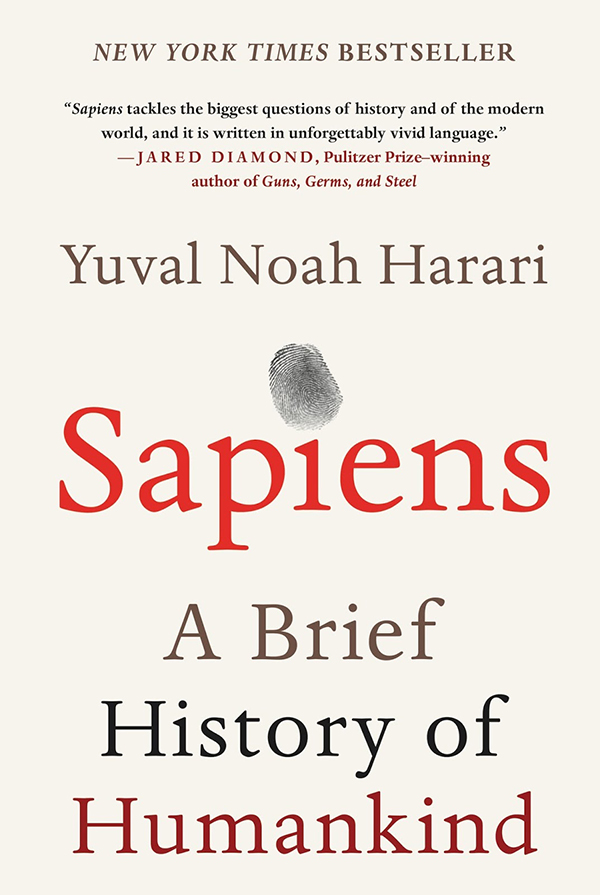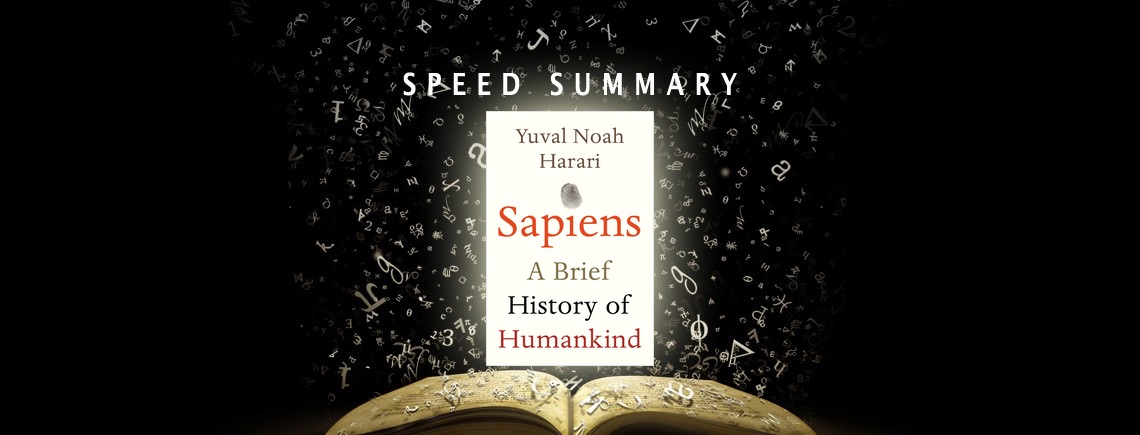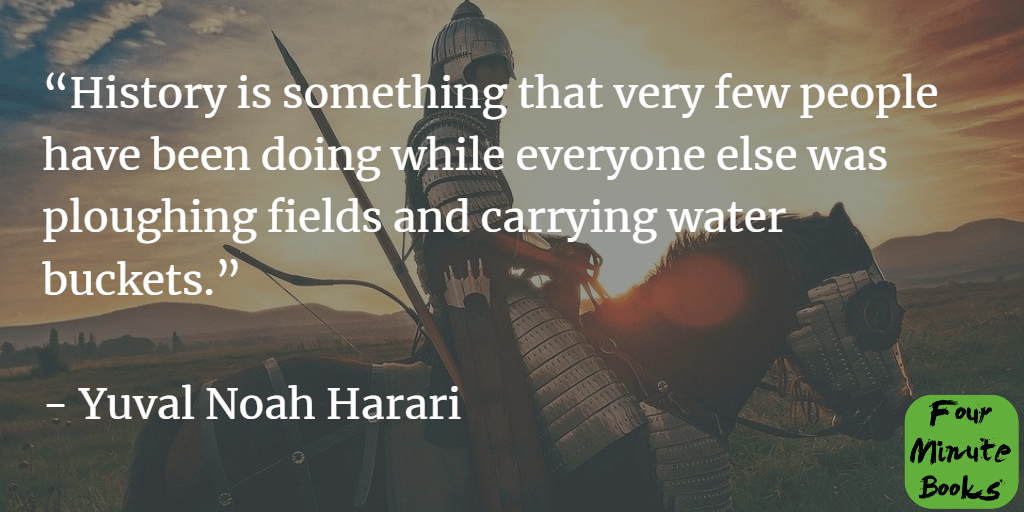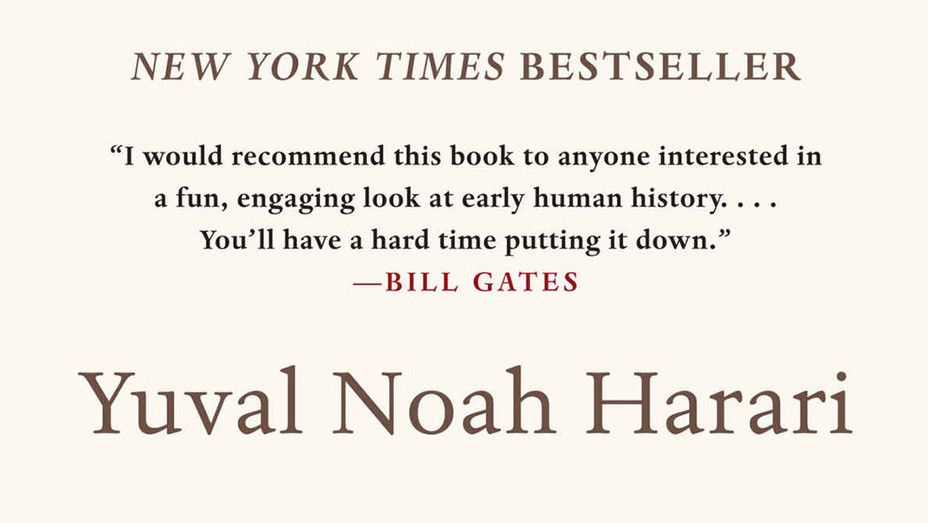Recommended for Startup Investors?
No
Why
Israeli historian and academic superstar Yuval Noah Harari breaks down the history of all humankind, including Sapiens vs. Neanderthals, caste systems, and other fun things. Great for sharpening up thinking but not necessarily related to angel investing.
My Notes By Chapter
- Ch 3 A Day in the Life of Adam and Eve: Monogamy vs. Polygamy is a tricky thing that we don't know yet if biological or not.
- Foragers secret of success was varied diet. Variety and nutrients are key.
- The Original Affluent Society
- Ch 4 The Flood: Within a few thousand years, 23 of 24 species Australian species weighing 100 lbs or more went extinct.
- Diprotodon, Megafauna, Copperlite is fossilized turds.
- If we are not careful, whales, sharks, tuna, and dolphins will follow the ground sloths, mammoths and diprotodons.
- Ch 6 Building Pyramids: Scarcity was never solved. History has historically been some very few people did.
- Evolution is based on differences not equality. Evolved differently is more accurate than created equal.
- Romantic Consumerism: “Romanticism tells us that in order to make the most of our human potential we must have as many different experiences as we can. We must open ourselves to a wide spectrum of emotions; we must sample various kinds of relationships; we must try different cuisines; we must learn to appreciate different styles of music."
- Intersubjective Reality: The imagined order is intersubjective. To change the order, would have to change millions of strangers.
- Ch.8 There is No Justice in History: Genetic superiority turned into social inferiority, so it made more sense to buy African slaves as opposed to European slaves, since the former had a partial genetic immunity to malaria and yellow fever.
- Ch 12. The Law of Religion: Cybele. Polytheistic Romans only killed a few thousand Christians while Christians slaughtered millions of each other in different sects
- Protest means faith is enough for redemption, while Catholic means you have to do good deeds. Fresco at St. Bartholomew's Day massacre.
- Polytheism is more tolerant than monotheism. Outside of East Asia, most are monotheists.
- Monotheists have a hard time dealing with the problem with evil. For dualists, such things are evil to explain because there's an evil power. But dualism doesn't do well with the problem of order.
- ...Dualistic religions: Gautama, to explore reality as it is without craving. "What am I experiencing now" rather than "what would I rather be experiencing?" He instructed people to avoid killing, promiscuous sex, and theft, since such acts stoke the fire of craving for power, sensual pleasure, and wealth.
- Suffering is created by crated by craving, this is dharma.
- New natural order religions that call themselves an ideology.
- Caste systems have existed for all eternity, but in the United States, race is the caste system.
Bonus Resources
Sapiens: Yuval Noah Harari on Travel and Romantic Consumerism - The Chorizo Chronicles
I read Sapiens at the beginning of this year after hearing it was recommended by Barack Obama. And let’s be real… The subtitle A Brief History of Humankind makes it sound like another boring history book, but in reality it’s far from boring. Harari, who’s a vegan, a heavy meditator and who has a qui…

Book Summary: Sapiens by Yuval Noah Harari
This is a book summary of Sapiens by Yuval Noah Harari. Read this Sapiens summary to review key ideas and lessons from the book.

Sapiens by Yuval Noah Harari: Summary, Notes, & Lessons - Nat Eliason
Fantastic history of humankind! Read it! Very interesting, you’ll learn about history, psychology, economics, it’s many lessons rolled into one compelling narrative.

If happiness is determined by expectations, then two pillars of our society – mass media and the advertising industry – may unwittingly be depleting the globe’s reservoirs of contentment.
A Brief History of Humankind Sapiens Yuval Noah Harari Chapter Summaries - Studypool
This study guide and infographic on A Brief History of Humankind Sapiens offers summary and analysis on themes, symbols, and other literary devices found in the text. Explore the wide library of materials on Studypool.com.

Speed Summary: Sapiens - A Brief History of Humankind - Brand Genetics
Sapiens: A Brief History of Humankind Author: Yuval Noah Harari Publisher: Harper Publication: 2014 (2011 in Hebrew) What does it mean to be human? In a sweeping narrative spanning two and half million years of human evolution, Israeli historian Yuval Noah Harari weaves insights from science and the…

Sapiens Summary by Yuval Noah Harari - Four Minute Books
1-Sentence-Summary: Sapiens is your guide to becoming an expert on the entire history of the human race as it reviews everything our species has been through from ancient ancestors to our dominating place in the world today. Read in: 4 minutes Favorite quote from the author: Try this fun …

Book Summary - Sapiens: A Brief History of Humankind
In “Sapiens”, Yuval Noah Harari presents a detailed history of how mankind came to dominate Earth. In this book summary, we’ll outline the forces that shape our lives, mankind’s impact on Earth and how we can think about our collective future.









